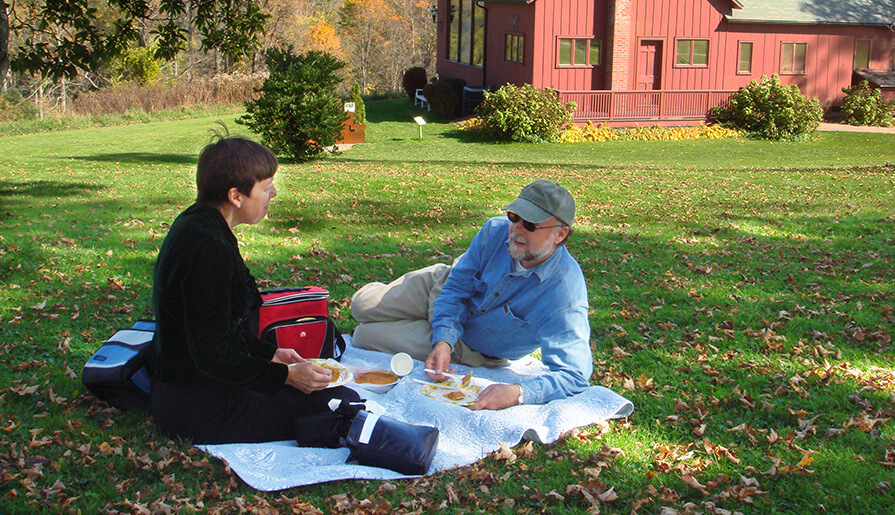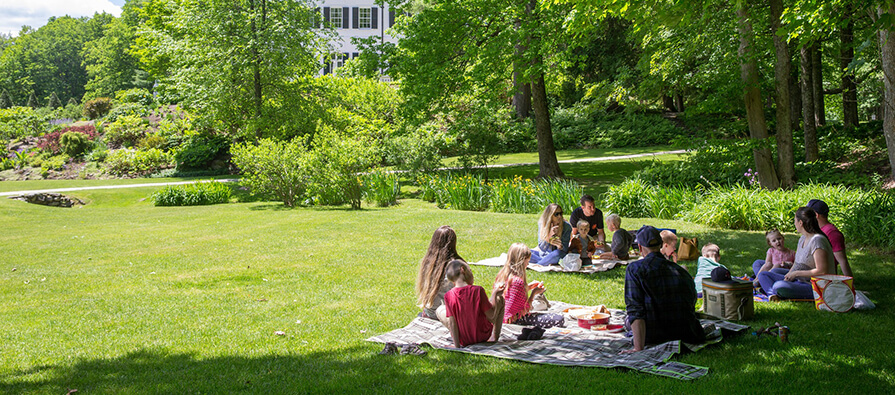Blankets, Baskets, and Boots: A Proper Picnic in the Berkshires
Posted on August 12, 2025Written by Nichole Dupont on behalf of 1Berkshire
Updated on September 09, 2025
 Olivia's Overlook. Photo by Abby Leadbetter.
Olivia's Overlook. Photo by Abby Leadbetter. Whether you’re a seasoned al fresco aficionado or just someone who loves a good sandwich on a gorgeous day, the Berkshires is brimming with perfect picnic spots—from winery lawns to sculpture gardens to riverside trails. Here’s where to lay down your blanket and dig into summer.
Balderdash Cellars tucked into the hills of Richmond, has generous tasting hours as well as a rotating lineup of food trucks and music on the weekends. Bring a blanket, good friends, and enjoy incredible views for miles.
Les Trois Emme Winery in New Marlborough is open Saturday and Sundays, 12-5, and offers tastings, occasional live music, and some of the friendliest hosts in the region. Before you sample some Grenache Rose, stop by The Southfield Store (yes, it’s in Southfield just a stone’s throw away) and treat yourself to one of their epic sandwiches and heavenly pastries–mini apple pie, salted caramel coffee cake, pistachio croissants.

Norman Rockwell Museum
Of course, the most iconic Berkshire picnic experience is catching a show on the Tanglewood lawn. Over the years, devotees have upped their picnic game to include candelabras and brocade tablecloths, but don’t sweat the food. Just bring a blanket or chairs and a side of take-away-gourmet from Guido’s Fresh Marketplace, Berkshire Food Co-op, or the Marketplace Specialty Store, all located in Great Barrington. And since it’s on the way, stop by Spirited in Lenox for some serious craft beer or Cotes du Rhone Rouge. Want to go all out? Call ahead and order one of their custom charcuterie baskets for the road/show.
For the first time in a few years, the art stars have aligned in the region, and several major museums and historic properties–including TurnPark Art Space in West Stockbridge, Norman Rockwell Museum in Stockbridge, Chesterwood in Stockbridge, The Mount Edith Wharton’s Home in Lenox, and The Clark in Williamstown–boast vibrant outdoor sculpture exhibitions framed by monolithic whimsy. These exhibitions are (mostly) free to visit, and wandering is highly encouraged, as is picnicking. If you are visiting up north, Craft Food Barn in North Adams prides itself on having full-to-the-gills patrons, or grab a hummus wrap or some classic chicken salad (and a specialty coffee) at Wild Oats Coop.

The Mount, Edith Wharton’s Home
If you are a picnic traditionalist, and only the great outdoors and a blanket in the sunshine will do, lace up your hiking boots to find the perfect spot along your trek. Many vista roads and conservation properties in the region are open for the season, including the C.M. Gardner State Park in Huntington, which has trails and picnic spots along the Westfield River. The Pleasant Valley Wildlife Sanctuary in Lenox boasts 1,000 acres of forests, meadows, mountains, wildlife, and birdsong. A recently completed all person’s trail makes this a property that everyone and anyone can enjoy.
Wherever your picnic takes you—winery, museum, mountaintop, or music lawn—don’t forget the essentials: bug spray, good food, and sensible shoes. Oh, and don’t forget the sandwich.
Explore more cuisine #intheberkshires here!
Funded, in part, by the Massachusetts Office of Travel & Tourism

Return to the Berkshire Blog.
More Posts
 Jacob's Pillow Pride Weekend.
Jacob's Pillow Pride Weekend. Diversity and Inclusion
Celebrate Pride and Community in the Berkshires
The Berkshires comes alive in June—not just with galas, theater, and music—but with the joy, visibility, and vitality of its…
Read More Dining at the Prairie Whale. Credit Kacey Hatch.
Dining at the Prairie Whale. Credit Kacey Hatch. Living Here
Welcome to the Berkshires – Right Where You Belong!
Moving to a new area, whether for professional or personal reasons, comes with a mix of emotions, an array of…
Read More The Barn Kitchen & Bar at the Williams Inn, credit Great Sky Media
The Barn Kitchen & Bar at the Williams Inn, credit Great Sky Media Things to Do
Berkshire Itinerary Trails
Follow these trails for ways to explore and discover fun of all kinds in the Berkshires. Mix and match to…
Read More
Food and Drinks
More Than a Meal: Baystate Hospitality Group’s Commitment to Food, Community, and Growth
The Berkshires in Massachusetts is known for its breathtaking landscapes, charming small towns, and rich history. This picturesque region, full…
Read More